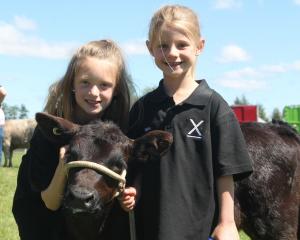
Dunedin scientist Tim Hore is proud as punch of the continued growth of TotoGen, a business he co-founded with Andy Ramsden in 2021 to provide low-cost analysis of sheep DNA.
While rising costs have been plaguing sheep farmers, he quipped that TotoGen was "the only thing that’s coming down".
The aim was to take the cost out of the collection so farmers received the full benefit of new technology and got the best possible value.
This season, TotoGen will launch the TotoPunch, an ear punch designed to be robust and simple to use, which was based on United Kingdom-designed fencing pliers which were then modified.
A bar-coded collection tube was fixed to the punch to collect the DNA.
It was a "fraction" of the cost of other solutions and used less plastic.
For those already using a scanning wand, the barcode could simply be scanned and added to the record of the animal. If not, a smartphone could be used to read the barcodes and input the data which was automatically uploaded to the cloud.
TotoGen processed four times the amount of samples that it did last year and was looking to double year-on-year as the business continued to grow, Dr Hore said.
It had a diverse range of clients.
Farmers were taking it up for various reasons: some were part of breeding programmes and needed to create breeding values for their sheep, some stud breeders were looking to create pedigrees, and there were also commercial farmers wanting to know more about how well their sheep were performing.
Clients ranged from big programmes involving multiple farms to single farms.
While some were familiar with DNA technology, others were doing it for the first time.
The last year had been about validating the technology — getting it out and working in the field in a diverse set of commercial circumstances.
The TotoPunch had been used at Dr Hore’s family property, Blackstone Hill, near Becks, and several other properties.
It could do thousands of samples a day.
While TotoGen was interested in testing sheep, the DNA kit could be used for any type of DNA analysis.
As a scientist, Dr Hore was excited about others making use of it for the likes of ecological studies.
There were challenges within the agricultural industry, particularly with greenhouse gas emissions, so it was about having the most productive animal — reducing total hooves but still having the same output.
"It’s farmer-focused stuff. What we’ve always wanted to do is pass on the benefits of new sequencing technology. What they [farmers] want is a cost-effective solution."
TotoGen was looking to set up a transitional facility to receive samples from overseas, citing huge potential in Australia and other countries.
It would be advertising soon for a bioinformatician.
It would also be expanding its capabilities to meet its growing clients’ needs, some through automation and others through more staff.
Getting the right people for any industry was key. TotoGen was fortunate to have the University of Otago — which "trains the right kind of people that we need" — nearby.
"It’s a massive achievement for us to keep growing, to have things keep moving forward.
"We’re doing what we said we were going to do."
















